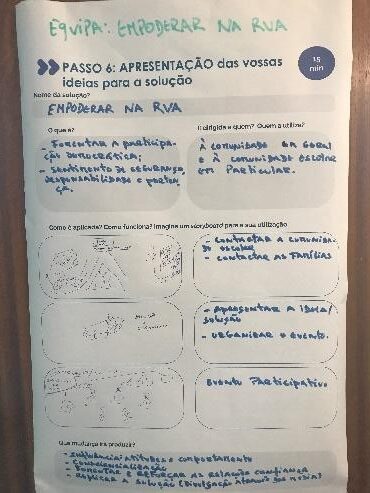Innovation meets Ideation in IcARUS workshops
The IcARUS Design Thinking workshops gathered a variety of stakeholders to develop innovative solutions that tackle urban security challenges
The IcARUS partners have been working over the past few months on building the foundations for designing and developing the project’s tools and practices. The six IcARUS partner cities laid the groundwork for the co-construction of urban security policies by launching the first Design Thinking Workshops with local stakeholders with the objective of designing innovative solutions to their urban security issues.
See the video of the methodology that was applied and read more, below, about the challenges addressed.
Using the Design Thinking methodology, the cities worked on identifying and defining their specific local issues and worked together with workshop participants to ideate concrete solutions. Each of the workshops included a representative sample of the local community, with attendees from civil society organizations, private sector companies, police and other local actors.
Based on the results of these workshops, the next step will be to redefine the problems and develop prototype tools to tackle them.
@Rotterdam organised their workshop on Safer Urban Spaces on 25 May
CHALLENGE: The Spaanse polder business park of Rotterdam, which is home to some 1,800 businesses and 24,000 employees, had long been somewhat neglected and had become a breeding ground for organised crime. Launched in 2014, the Holsteiner project seeks to restore order and reshape the landscape of this vast industrial estate. Despite some progress, a lot remains to be done. The challenge is to minimise the opportunities for crime but also to promote social cohesion within the industrial estate.


@Nice organised their workshop on Safer Urban Spaces on 8 June
CHALLENGE: The main challenge of the City of Nice is to strengthen feelings of security among residents of the Nice North district. Located in the heart of the city, this neighbourhood has two distinct areas, one rather well off and the other more working class. It is also a hub of activity and a buffer zone at the city’s point of entrance and exit.
The risk of burglary, which often increases during the summer, was identified as one of the root causes of residents’ feelings of insecurity. However, following exchanges with the local stakeholders that participated in the workshop, other root causes were identified, such as illicit trade, and in particular drug trafficking, as well as noise and crowdedness.

@Turin organised their workshop on Juvenile Delinquency on 14 June
CHALLENGE: The Turin Municipal Police has long been working on the prevention of juvenile delinquency by focusing on pre-adolescents and adolescents aged up to 18 as well as on young adults. Now, they are also working in close collaboration with NGOs targeting children in their first 1,000 days of life. This type of early prevention has become necessary with the emergence of what local media have termed ‘baby gangs’, or groups of very young people who gather spontaneously and are sometimes violent.
On top of the various measures taken, the challenge for the Turin Municipal Police is to deepen the understanding of juvenile group dynamics by collecting more data on the field. The City of Turin hopes that a better and deeper understanding of the youth violence phenomenon will help them design more efficient and effective prevention policies.


@Lisbon organised their workshop on Juvenile Delinquency on 20June
CHALLENGE: The City of Lisbon and the Lisbon Municipal Police seek to prevent juvenile delinquency and anti-social behaviour in a number of neighbourhoods where community policing teams work closely with local partners to jointly tackle security issues and improve residents’ perception of security. Notably, young people belonging to minority groups who grow up in socio-economically disadvantaged neighbourhoods are at risk of following life patterns that lead to or perpetuate social exclusion in adulthood.
As part of the IcARUS project, the Lisbon Municipal Police are working on the prevention of juvenile delinquency and antisocial behaviour among the young and are developing a tool to promote safe behaviours and positive lifestyles (more info on the article here).


@Riga organised their workshop on Designing and managing safe public spaces on 29June
CHALLENGE: Once labelled ‘the crime capital of Europe’, the reputation of Riga, the largest city in the Baltic states, has significantly improved over the past decade. Today, it is a safe and vibrant city with a growing tourism industry, its Old City buzzing with cafes and restaurants. Most crimes and offences committed in the city are linked to the consumption of alcohol in public places, which is illegal. Recent initiatives to decriminalize it have been thwarted by conservative parties in Parliament.

@Stuttgart organised their workshop on Preventing Radicalisation on 5July
CHALLENGE: Although radicalisation leading to violent extremism is not an issue in Stuttgart, the city has had to deal with new ideological movements and actors that have emerged in the past two years in relation with the Covid-19 pandemic. Born in Stuttgart, the Querdenker movement has become nationwide, organising sometimes violent protests against Covid restrictions that have attracted widespread media attention. The state-level internal security agency, the Office for the Protection of the Constitution of Baden-Württemberg (Verfassungsschutz), has identified a growing radicalisation trend within the movement, with right-wing extremist and anti-government narratives gaining ground.
The city of Stuttgart has also been the theatre of serious riots involving hundreds of young people in June 2020, which spiralled into violence against police forces, vandalism and looting. Since then, more riots and revolts against police orders broke out in the city centre, albeit less serious.


Stay connected by subscribing to our Newsletter and social media and learn more about the Tools that will be developed!

subscribe to be the first to receive icarus news!
Know what we've been up to and the latest on the European urban security frame.








